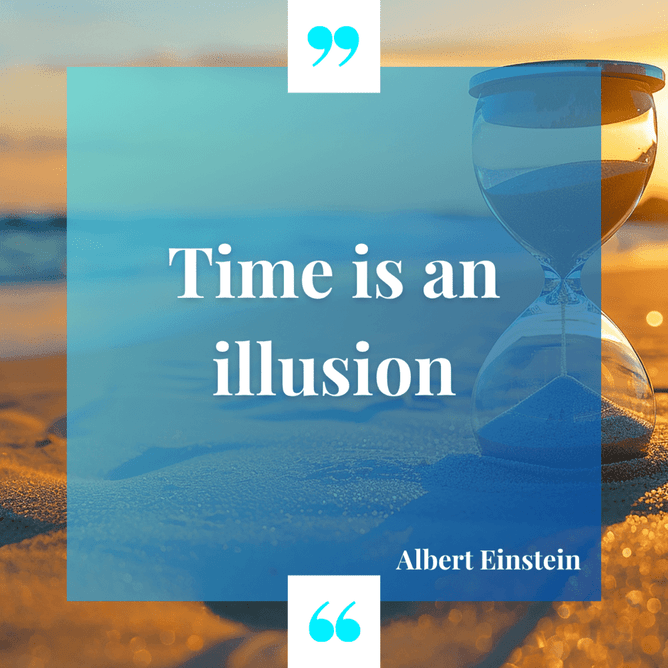⏳ 𝗧𝗶𝗺𝗲: 𝗔𝗻 𝗨𝗻𝗯𝗲𝗹𝗶𝗲𝘃𝗮𝗯𝗹𝘆 𝗛𝗮𝗿𝗱 𝗖𝗼𝗻𝗰𝗲𝗽𝘁
Time is strange. Ten minutes to write an answer in an exam feels like nothing — but ten minutes waiting for a loved one to arrive at the airport after a long time apart can feel like an eternity.
Lately, I’ve found myself overwhelmed by time. It’s that season — the end of the school year 🎓, the end of the financial year 📊, social events ramping up 🎉, Christmas on the horizon 🎄. There’s just so much, and never enough time.
I’m a time optimist when it comes to thinking through what I can do. I sit down to do a “quick” task that I think will take an hour and suddenly, five hours have disappeared. Then I look at my list and think: 𝘸𝘩𝘦𝘳𝘦 𝘥𝘰 𝘐 𝘦𝘷𝘦𝘯 𝘴𝘵𝘢𝘳𝘵?
𝗧𝗶𝗺𝗲 𝗯𝗹𝗶𝗻𝗱𝗻𝗲𝘀𝘀. 𝗧𝗶𝗺𝗲 𝗼𝗽𝘁𝗶𝗺𝗶𝘀𝗺. 𝗔𝗻𝗱 𝗮 𝗰𝗼𝗻𝘀𝘁𝗮𝗻𝘁 𝗳𝗲𝗲𝗹𝗶𝗻𝗴 𝗼𝗳 𝗻𝗼𝘁 𝗸𝗻𝗼𝘄𝗶𝗻𝗴 𝘄𝗵𝗮𝘁 𝘁𝗼 𝗱𝗼 𝗳𝗶𝗿𝘀𝘁.
We learn to tell the time when we’re young — surely, by now, we should know how long ten minutes is? But time is a human construct, and our experience of it is anything but consistent. Ten minutes can stretch, collapse, or disappear entirely depending on focus, physiology, pressure, emotion, or environment. That mismatch between measured time and felt time can be exhausting.
For ADHDers, time can be especially tricky — it’s often “now” or “not now”. Knowing what’s most important to do first can feel impossible, and the overwhelm is never far away.
I’ve tended to just push through, powering on until I finally feel like I’ve done enough. But recently, I made myself pause ✋. To step back. To interrupt the cycle instead of accelerating it. And to just start small.
Maybe the challenge isn’t that there isn’t enough time — but that time is fundamentally human, shaped by our biology, psychology, and the context we’re moving through 🌱.
It’s a two-way relationship: our internal and external worlds influence how we experience time, and the way time unfolds influences us right back.
💭 𝗛𝗼𝘄 𝗱𝗼𝗲𝘀 𝘁𝗶𝗺𝗲 𝘀𝗵𝗼𝘄 𝘂𝗽 𝗳𝗼𝗿 𝘆𝗼𝘂 𝗮𝘁 𝘁𝗵𝗶𝘀 𝘁𝗶𝗺𝗲 𝗼𝗳 𝘆𝗲𝗮𝗿?
𝘐𝘧 𝘺𝘰𝘶 𝘸𝘢𝘯𝘵 𝘵𝘰 𝘦𝘹𝘱𝘭𝘰𝘳𝘦 𝘺𝘰𝘶𝘳 𝘳𝘦𝘭𝘢𝘵𝘪𝘰𝘯𝘴𝘩𝘪𝘱 𝘸𝘪𝘵𝘩 𝘵𝘪𝘮𝘦, 𝘐’𝘥 𝘭𝘰𝘷𝘦 𝘵𝘰 𝘩𝘦𝘢𝘳 𝘧𝘳𝘰𝘮 𝘺𝘰𝘶.






